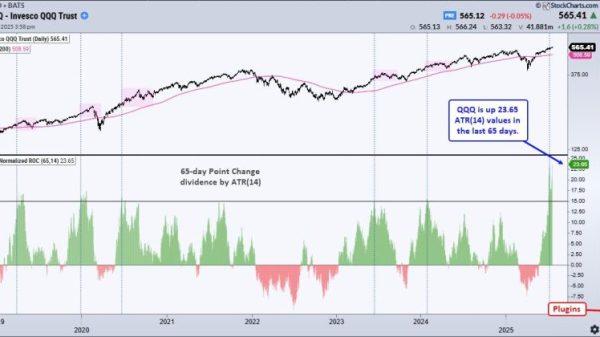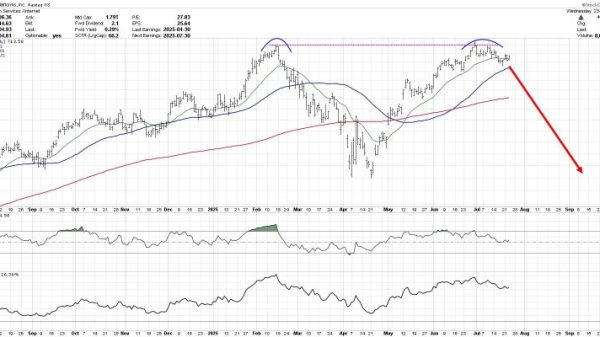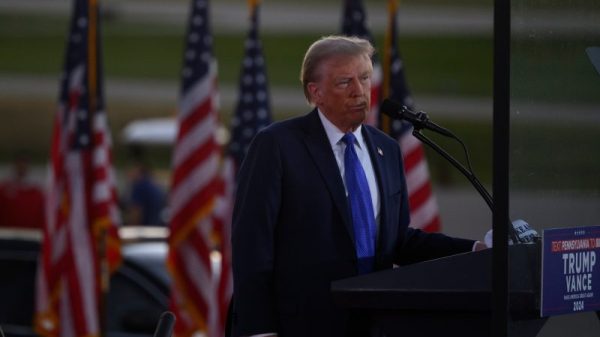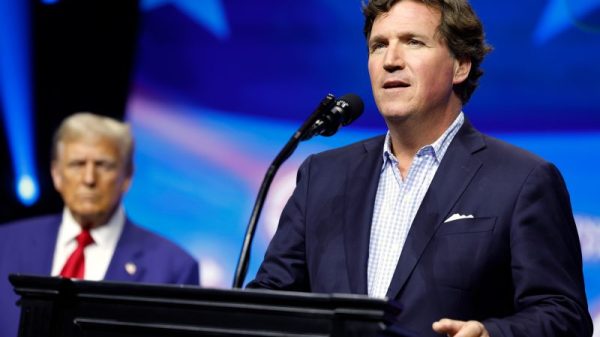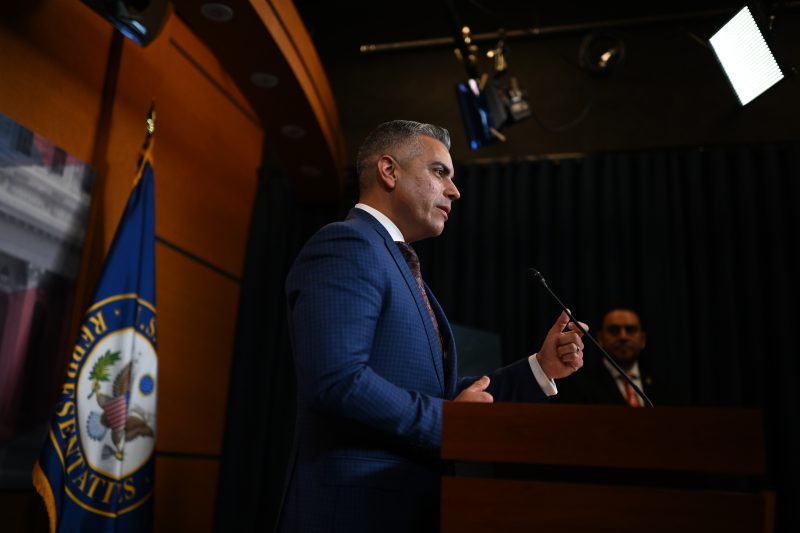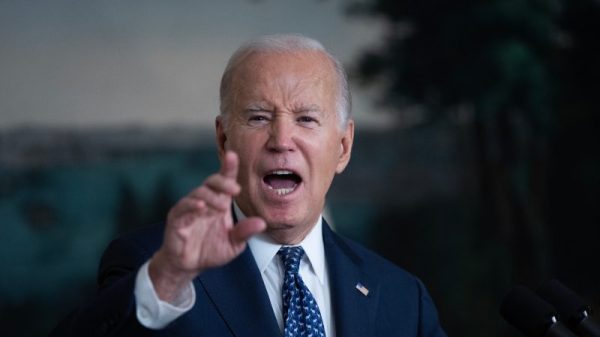A small group of House Republicans will spend the run-up to Election Day stressing an unexpected message: support for abortion rights.
With control of the House on the line, Republican lawmakers running in districts that Joe Biden won in the 2020 presidential race have moderated their message on abortion — including, in some cases, using the term “pro-choice.”
Not all of the Republicans using the phrase support the legal protections for abortion that Democrats have championed. But their tone is a significant shift that reflects the Democrats’ success in campaigning on the issue since 2022, when the Supreme Court overturned Roe v. Wade, and hints at Republican anxiety about how voters are responding. In the vice-presidential debate on Tuesday, JD Vance (R-Ohio) conceded that the Republican Party has to do a better job in “earning the American people’s trust back” on abortion.
That effort is already underway. In a campaign ad released last month, GOP House candidate Matt Gunderson, a business executive running against Rep. Mike Levin (D) in a Southern California swing district, looks directly into the camera and calls himself “pro-choice,” a descriptor that has long been considered synonymous with abortion protections that the Republican Party has opposed. “I believe abortion should be safe, legal and rare,” he says in the ad.
Rep. Juan Ciscomani (R-Ariz.), who has voted against national abortion restrictions in the past, is stressing in multiple ads that he “always supported exceptions for rape, incest and, of course, protecting the life of the mother.”
“I want you to hear directly from me: I trust women. I cherish new life, and I reject the extremes on abortion,” he says in another ad.
And Rep. John Duarte (R-Calif.), who has favorable ratings from antiabortion groups thanks to his voting record, nevertheless recently told The Washington Post that he has always backed abortion rights. “I told [voters] in the primary last time, I told it to them in the general last time,” he said. “I’ve been on record, and I’m pro-choice.”
A shift in strategy
The apparent shift in tone on reproductive issues is striking because in recent year the Republican Party has focused, more often than not, on its success limiting access to abortion.
Just two years ago, restricting reproductive rights was a top House GOP legislative priority. Before the Dobbs decision overturned Roe v Wade, House Republicans had long called for national restrictions on abortion, and the party’s platform during the 2016 election endorsed legislation that would enact a federal ban on abortion after 20 weeks of pregnancy.
In January 2023, during one of the first votes of the 118th Congress, every House Republican voted for a bill requiring that a fetus be provided medical care if born alive after an attempted abortion, which is already law. Later that year, most vulnerable Republicans voted to amend bills funding the government to add provisions that would prohibit servicewomen from crossing state lines to receive an abortion. Many moderate GOP aides and strategists decried that vote as ammunition for attack ads by opponents.
Former president Donald Trump has repeatedly noted on the campaign trail that Roe was overturned thanks to the three justices he appointed to the Supreme Court. But the message has not been particularly popular with voters. A Washington Post-ABC News poll in August found that 62 percent of Americans oppose the overturning of that five-decade-old decision, while 35 percent support it.
Trump has struggled with how to describe his position on abortion as he has tried to woo independents without alienating social conservatives in his base. In August, he declared an amendment to add abortion protections to the constitution in his home state of Florida to be “radical” — but 24 hours later suggested he would probably vote for it.
In the 2022 midterms, the Democrats campaigned on a promise to defend reproductive rights, helping thwart an anticipated “red wave,” even though Republicans ultimately flipped the House majority. Democrats have doubled down on that strategy this year.
In response, Republican strategists have spent the past year urging candidates, particularly those in swing districts, to highlight efforts to protect some reproductive rights, demonstrate more sensitivity when talking about abortion, and to use phrases such as “limitations” and “late-term” abortions as opposed to “bans.”
In January, the chairman of the National Republican Congressional Committee, the House Republicans’ campaign arm, told reporters that GOP candidates were being encouraged to state their positions on abortion and contrast them with their opponents to counteract Democrats’ messaging dominance on the issue.
“Our position on abortion is actually closer to the American people than the Democrat position,” said Rep. Richard Hudson (N.C.), the NRCC chairman. “But the people don’t know that because we didn’t talk about it and the Democrats spent hundreds of millions of dollars telling their side of the story.”
Democrats argue that polls show that a majority of voters prefer a federal law restoring a nationwide right to abortion, rather than letting states decide whether the procedure is legal.
Last month, Rep. Suzan DelBene (Wash.), chairwoman of the Democratic Congressional Campaign Committee, the House Democrats’ campaign arm, said House Republicans have tried to “cover up their antiabortion records with fibs and falsehoods” because they are “now realizing that they are on the wrong side.”
A more moderate message
The shift in tone is perhaps most clear in Gunderson’s ad. In it, he tells voters in his swing district that he considers himself pro-choice, adding that the viewer “might disagree, but that’s okay.”
“But I bet there’s more that unites us,” Gunderson says in the ad, before pivoting and saying he wants to, among other things, secure the border and lower gas prices.
In an interview with The Post, he said he doesn’t believe Congress should legalize abortion access nationally, arguing that the issue should be kept to the states, like the Supreme Court decided.
“The reality is that this decision has been made in California, and my position, you know, on it is consistent with California law,” he said, referring to the 2022 codification of the right to abortion in the state’s constitution.
Levin, Gunderson’s challenger, argued that voters won’t forget that his opponent criticized California’s efforts to protect abortion rights when the issue was on the ballot in 2022.
“For him now to claim to be ‘pro-choice’ … Well, how does he square that with calling Proposition 1 ‘disgusting’ just two years ago?” Levin told The Post.
Gunderson, however, said he opposed Proposition 1 because it “opened up a Pandora’s box to late-term abortion, and I think that takes the issue out of the mainstream.”
As The Post reported in 2022, the antiabortion movement interpreted the proposition’s text to mean that no limits — including on late-term abortions — can be enforced if the measure passed. But proponents argued that the constitutional protection preserves lawmakers’ and state courts’ rights to regulate abortion — allowing them, if needed, to tackle antiabortion policies that opponents could bring up.
Vulnerable Republicans representing blue-leaning districts in New York also are making their positions known for the first time. Looking straight into the camera, Rep. Marcus J. Molinaro says he believes “health decisions should be made between a woman and her doctor. Not Washington.” Rep. Michael Lawler tells constituents he is “fighting so hard to protect access to IVF treatments” after he and his wife, Donna, who is sitting next to him in the ad, had difficulty getting pregnant.
Pennsylvania state representative Rob Mercuri, who is running against freshman U.S. Rep. Chris Deluzio (D), lists a number of policies he supports that he said unite swing-district voters, including opposition to “criminalizing abortion because demonizing women over health-care choices isn’t right.”
Some feel compelled to clarify their record because Democratic candidates and Democratic Party campaign arms have devoted so much ad time on abortion access in the first presidential election post-Dobbs.
Ciscomani, who is running for reelection in a southern Arizona swing district, devoted a campaign ad countering former state senator Kirsten Engel’s ads on his abortion position by pointing out the numerous times he has discussed the issue over the past year.
A day before House lawmakers left Washington for a month of campaigning, Ciscomani told The Post that there has been “so much misinformation about where I stand on the issue that … it’s important for voters to hear it directly from me.”
Marianna Sotomayor contributed to this report.

